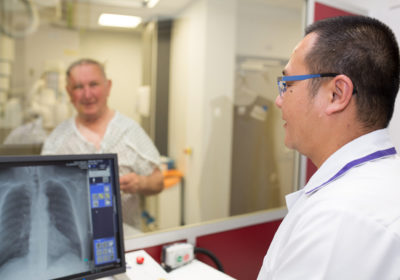An independent review found inspectors from the Care Quality Commission (CQC) lacked experience – some had never been into a hospital before, while some care home inspectors had never met a person with dementia.
Wes Streeting said he was “stunned” by the scale of the problems as he announced a set of emergency measures.
The CQC said it accepted the findings in full. The full interim report was published this morning (Friday).
Lacking experience
The CQC inspects everything from hospitals and GP practices through to care homes and dental surgeries, covering 90,000 different services.
It gives services one of four levels of ratings – outstanding, good, requires improvement and inadequate.
They can be used by the public to help guide them when choosing care homes or GP surgeries, or to decide which hospital to go to for an operation.
Among the failings identified were:
- Inspectors lacking the necessary experience – including some being asked to inspect hospitals without ever having been into one before
- Care home inspectors who had never met a person with dementia
- A backlog of assessments with one in five services never having been given a rating – this is thought to include new care providers, GPs and private health clinics that have opened in the last five years
- One NHS hospital having gone more than 10 years since its last inspection
- A lack of consistency with assessments
‘Stunned’
Mr Streeting said: “I have been stunned by the extent of the failings of the institution that is supposed to identify and act on failings.
“It’s clear to me the CQC is not fit for purpose.
“We cannot wait to act on these findings so I have ordered publication of this interim report so action can begin immediately.”
Among the measures being taken is the appointment of Sir Mike Richards, a vastly experienced cancer doctor who has previously worked in government as national director of cancer care and spent four years as the chief inspector of hospitals from 2013, to work with senior leaders at the CQC and conduct a “rapid review” of the watchdog.
The regulator has just appointed an interim chief executive, Kate Terroni, who was deputy chief executive until last month when Ian Trenholm announced he was stepping down as head of the CQC.
Mr Streeting told BBC Breakfast he was also looking to appoint a new chief executive and chief inspector of hospitals who the government “can work to turn the regulator around”.
The CQC has also been asked to report into the Department of Health and Social Care on a regular basis on the steps it is taking.
The health secretary said he had asked the CQC to introduce “transparency” around how their ratings were reached – including whether or not they were the result of a full inspection – so the public could reach their own decisions as to whether they are an “accurate reflection of the quality of care”.
He said that, at present, “I can’t have confidence in [the ratings, and] I don’t think the public can”.
“I would take those ratings today with a pinch of salt,” he told Radio 4’s Today programme.
The review into the CQC has been led by Dr Penny Dash, who chairs the board overseeing north west London’s health and care system.
It was ordered by the last government in May amid concerns about the CQC’s performance.
Dr Dash has interviewed more than 200 senior NHS staff and carers along with more than 50 people who work for the CQC to draw up her interim findings.
Her final report will be published in the autumn.
She said: “The contents of my interim report underscore the urgent need for comprehensive reform within the CQC.”
Difficult journey
Prof Martin Green, chief executive of Care England, which represents social care providers, said he was pleased the problems were being acknowledged, saying his members had been raising these concerns.
“This is going to be a long and difficult journey for the CQC, but one that is entirely necessary.”
Sir Julian Hartley, of NHS Providers, which represents NHS trusts, agreed.
“Trust leaders will welcome this announcement.
“Based on their clear and consistent feedback, we have been calling for urgent reform of the CQC.
“We fully agree with these recommendations.”
Ms Terroni said work was already under way to address the problems.
“We accept in full the findings and recommendations in this review, which identifies clear areas where improvement is urgently needed.”
Mr Streeting said the health and care watchdog needed “radical reform” to restore public trust in its ratings, but credited those who worked for the CQC and had been “sounding the alarm”.
Source: https://www.bbc.com/news/articles/cjk3p4jnnl6o
Response to the interim findings of the Dash review into CQC’s operational effectiveness
The CQC issued the following statement after the publication of the Dash review:
The interim findings of the review of our operational effectiveness led by Dr Penelope Dash have been published this morning.
In response, Kate Terroni, our interim chief executive, said: “We accept in full the findings and recommendations in this interim review, which identifies clear areas where improvement is urgently needed.
“Many of these align with areas we have prioritised as part of our work to restore trust with the public and providers by listening better, working together more collaboratively and being honest about what we’ve got wrong.
“We are working at pace and in consultation with our stakeholders to rebuild that trust and become the strong, credible, and effective regulator of health and care services that the public and providers need and deserve.
“Work is underway to improve how we’re using our new regulatory approach. We’ve committed to increasing the number of inspections we are doing so that the public have an up-to-date understanding of quality and providers are able to demonstrate improvement.
“We’re increasing the number of people working in registration so we can improve waiting times. We’re working to fix and improve our provider portal, and this time we’ll be listening to providers and to our colleagues about the improvements that are needed and how we can design solutions together.
“We’ll be working with people who use services and providers to develop a shared definition of what good care looks like. And we’re also developing a new approach to relationship management that enables a closer and more consistent contact point for providers.
“Additionally, to strengthen our senior level healthcare expertise, we have appointed Professor Sir Mike Richards to conduct a targeted review of how the single assessment framework is currently working for NHS trusts and where we can make improvements.
“Sir Mike’s career as a senior clinician, and a distinguished leader of high-profile national reviews, as well as his direct experience of driving improvement through regulation, make him uniquely placed to conduct this work.”
Source: https://www.cqc.org.uk/news/stories/response-interim-findings-dash-review






